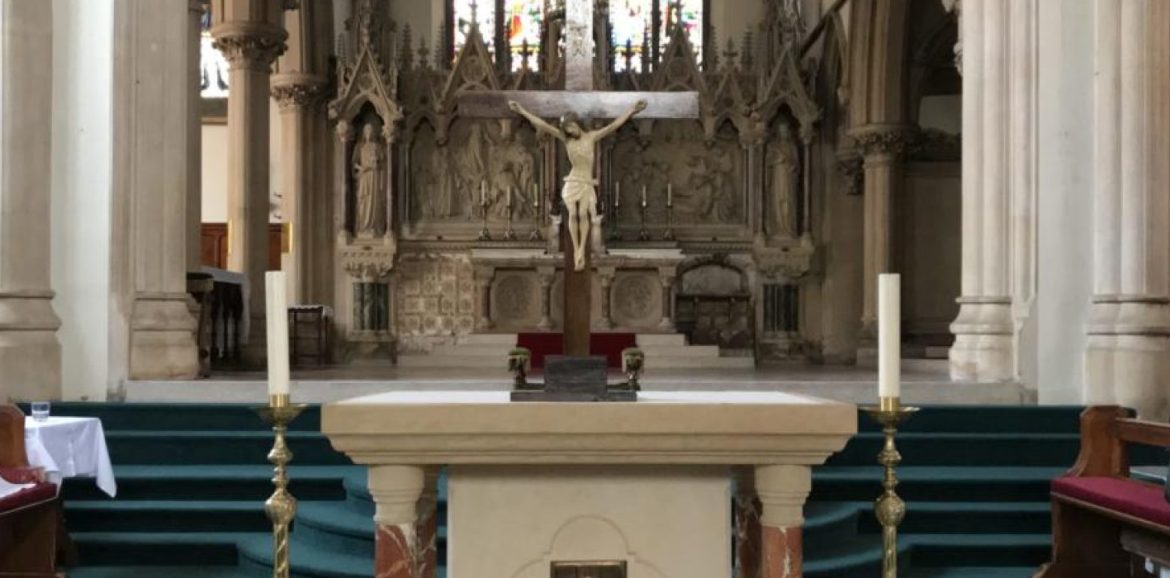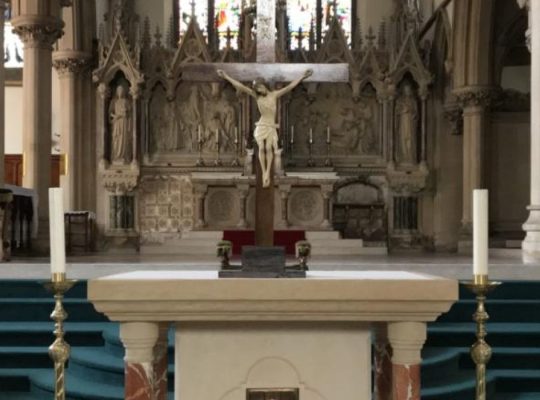On the road that goes up to Jerusalem, Jesus teaches his disciples what “to follow’ him implies. What he has said, what he has done, those who have come to him, his resolution, reveal the surprising plan of God into which disciples of all time must enter willingly, and resolutely. Clearly this is the reason that Luke recounts these words, these incidents and encounters. He does so, as we have already noted, in the light of the experience of Christian communities of his time, around A.D. 70-80. In other words he has handed down, what he reports faithfully and presents “in an orderly sequence” (Luke 1:2) that which is situated and understood in the “present day” of the life of the Church. This is what we must do in our turn when we read and listen to this Gospel.
Although Luke tells us over the next ten chapters, that Jesus is on the road to Jerusalem, It is plain to see that Jesus passes away from Jerusalem, down the road by Jericho to the Jordan, up the valley through Peroea to favourite places by the sea of Galilee. From this time it becomes very difficult to trace his movements. For the next few months, the five before his death, he moves from place to place, almost as if he would not court danger by remaining too long in one place, and all the evangelists seem to join in the conspiracy of silence, covering his footsteps wherever he goes. During this period, they tell us of many events; they give us momentous discourses; but when, or where, or under what circumstances they seldom say. Jesus obviously has an urgent mission before his leaving us; and perhaps he has ordered his disciples to say nothing, as he sometimes did in the past, or perhaps it was just, that his time had not yet come. However, it is more likely that he needs to prepare his disciples to carry on his mission, and so we learn today of this next event told to us by Saint Luke.
“At that time, the Lord appointed seventy-two others and sent them out ahead of him, two by two every town and place where he himself was to go.” Having recalled what Jesus said about the requisite conditions for “following” him in last Sundays Gospel, Luke comes to the instructions given by the Master to his messengers; in today’s Gospel. In Matthew and Mark, this discourse — for it really is a discourse — is addressed to the Twelve, for when they are sent out. (Matt10:7-16, Mark 6:8-13) But Luke understood that it is not only this small, initial group that is concerned, but as we shall see a much larger group. This is not merely a personal interpretation, isolated or occurring only well after the event. Very soon, even before Pentecost, Peter suggested that among the disciples who were not of the Twelve, a replacement should be chosen for Judas. The lot fell to Matthias, who then joined the other Eleven. Also, rather quickly, “other messengers” were mandated to bear the good news to all the nations. Such was the “particular case” of Paul, but how many instances of this are testified to in Acts and in Paul’s letters? Luke tells us that these initiatives are in line with what Jesus himself did in appointing “seventy-two … whom he sent ahead of him in pairs to every town and place he intended to visit.” It is a matter of more than simply designating messengers to find a sleeping place in a village in Samaria. One is in the presence here of a true mission, a mission to all places.
Who were these seventy-two that the Lord appointed? From whom were they chosen? We cannot be sure. Where did the selection take place, and into what cities were they sent? Saint Luke who alone records the fact gives us no hint. It is all in marked contrast with the choice and mission of the Twelve, set apart on the mountain overhanging Capharnaum, sent to preach in Galilee, and in Galilee alone, whose names are carefully given by Matthew, Mark and Luke and whose mission is over before the paschal season of that year.
As for the seventy – two, the number “seventy-two” is itself symbolic. In fact, in the Book of Genesis, according to the Greek version (Septuagint), it is the number of people in the whole world. These seventy-two disciples obviously were taken from the crowds of disciples following Jesus. Jesus would know them, he would know what was in their hearts, and out of this willing, eager, proud to be chosen crowd, Jesus could easily form a band of pioneers who would “make the path straight” for him as he went along. Their mission would confirm by miracles, especially by the casting out of devils. They would gather together the inhabitants along the road, ready to see and hear the Master as he passed. When the expedition was over, they would meet again on the border of the lake.
The Lord gives us an insight to the immense mission set before his disciples (us included) The workers will always be too few in the huge field of the apostolate, which is as wide as the world. For the ripe harvest is already large, as the messengers testify on their return and as Luke reports in Acts. Hence the invitation to pray that the “Master of the Harvest” will send his workers. This is in imitation of the Father, who sent his Son and gave him “all power in heaven and on earth” especially to invest his disciples with the mission to be his “witnesses in Jerusalem, throughout Judea and Samaria, and to the ends of the earth.” In order that this work may be accomplished, the disciples must join their prayer to that which the Son constantly addresses to the Father. Their mission is no less perilous than Jesus’: they are sent “as lambs in the midst of wolves,” with no other defence and consolation than that of the Spirit, with no other assurance than the promise that they will not be confounded. Whatever their success or the power they exert over the forces of evil, their cause of joy must be that their “names are inscribed in heaven.”
Luke also had experience of this, thanks to the example of Paul, whom he accompanied on several apostolic journeys. The seventy-two went their way. They did their work as Jesus had commanded them and returned. They went two by two; they preached the kingdom in places which had not yet heard the word. As he had told them they would, they worked miracles; to their own astonishment they cast out devils. And it was all so easy; it had been needful only to call upon his name, to act in his name, and the work was done. They came back full of their achievement. They compared their experiences, one with another. They gathered about him and told him how well they had done. He welcomed them; he was glad that they were glad on their return from their first adventure. But there would be many more adventures to come. The Lord knew this, he knew the urgency of their mission and the difficulties they would face, “I have given you authority to tread on serpents and scorpions and over all the power of the enemy; nothing shall ever hurt you. Nevertheless, do not rejoice in this, that the spirits are subject to you; but rejoice rather, that your names are written in heaven.”
And so, this discourse is thus lent to the concrete instruction addressed to missionaries of the Gospel. From the beginning, they are admonished to “carry no money bag, no knapsack, no sandals and greet no-one along the way.” In other words, “Do not bear anything that will encumber your journey. Think not of your needs; you will receive them from those who welcome you into their homes. Do not waste time in vague pleasantries. Time is short” Such is the sense of urgency of this mission and such little time to fulfil it!
Their only valuable is peace, which they are to offer generously. This “peace” is a messianic gift, work of the Spirit, a sign of the coming of the kingdom: “On earth, peace to those on whom his favour rests.” Jesus granted this peace himself, and it is one of the most beautiful fruits of his Easter victory. Whether one accepts or rejects it — it does not depend on the messenger — it is a sign of the proximity of the kingdom, like the healing of the sick.
The message, the messengers announce is this: “The reign of God is at hand.” A very short message offered to all, while allowing each to welcome it or not. Nevertheless, even for those who refuse to open their doors, the kingdom of God is at hand. This is why, shaking the dust from their feet, the missionaries repeat that “the kingdom of God is at hand.” One day, perhaps, others will harvest this ground, which was at first barren. In any case, one only gathers fruit that was sown at another time. The duty of the messengers is to sow the seed wherever they go. The final result? It is not theirs to see immediately: it will appear at the day of judgement. May they remember the parable of the seed and the sower (Luke 8:4-14). It must have been inspired by Jesus’ personal experience. Did he not do the same at the towns where he taught and multiplied miracles, at Capernaum? But his lack of success, which he felt so keenly, never prevented him from rejoicing in the Holy Spirit and saying “I give you praise, Father, Lord of heaven and earth, for although you have hidden these things from the learned and the clever, you have revealed them to mere children. Yes Father, such has been your gracious will.” This is what, Luke tells us, at the very moment when the seventy-two were marveling over the success of their initial mission. Jesus gladly shared their enthusiasm. But he sees further than they do, even to the final fall of Satan at the end of the battle between Good and Evil, between Light and Darkness. This will be “on the. Day of judgement.”
In the meantime, it falls to everyone to fulfil the mission given, knowing that, however modestly, they are working towards this victory that is “already” begun, and while rejoicing to have their name written in the heavens, all Christians must be those who, having recognized in Jesus the “Messiah of God” dead and risen on the third day, follow him by taking up their cross daily, knowing that “to lose one’s life” for him is to save it. They are actually “clothed with Christ” at baptism. Thus, conformed to him, one with him, become children of God by the Spirit that has been given to them, the heritage promised to Abraham becomes theirs. Their life, whatever its duration, their vocation, their vicissitudes, their windings, are one constant “journey toward Jerusalem,” begun and followed resolutely. With him they know the defeats on the road. But always going forward, with never a backward glance, pilgrims without hearth or home, they travel free, under the guidance of the Holy Spirit, with no other law than that of love for one another. But the road is long and winding. Whatever the strength of their faith and resolution, those who “follow” Christ need to hearken to the announcement of the good news that reawakens the joy of pilgrims. May they not be discouraged! The time is pressing. “The Kingdom of God is at hand.” There is still much to do for the harvest to be gathered. Everyone must pray with Christ, and through him, that the Father “Send workers for the harvest.” But at the same time be ready oneself to labour, and to play their part if one is sent.
“May the peace of Christ, reign in your hearts.”


